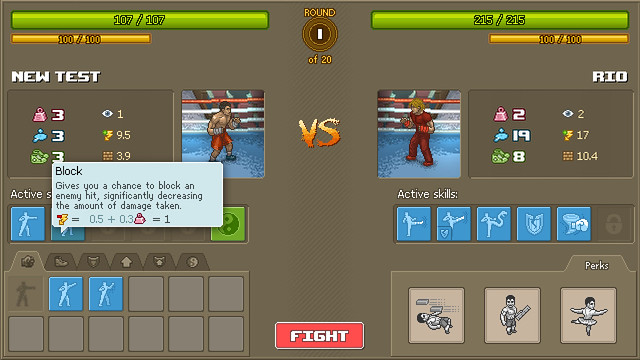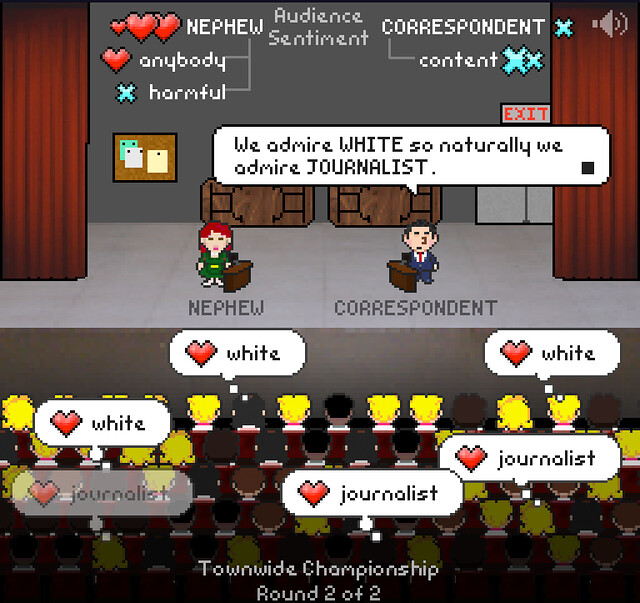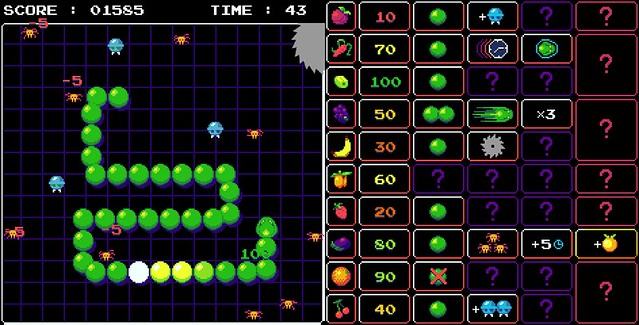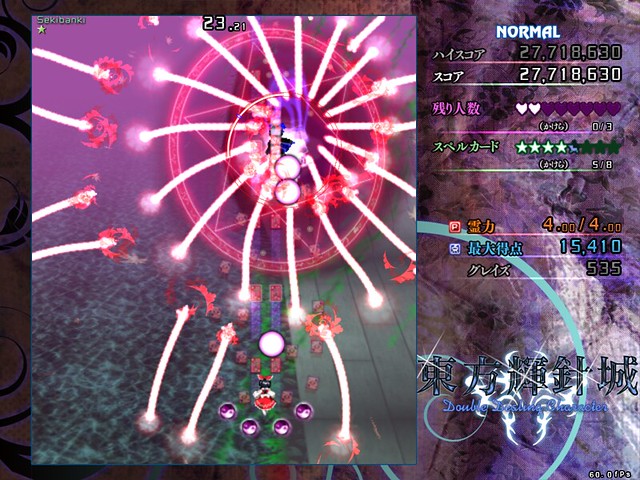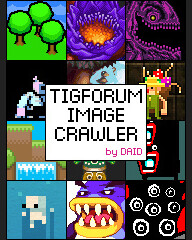Punch Club
By: Derek Yu
On: February 24th, 2016
The Rocky Balboa-esque boxing theme and pixel art are what got me to try out Punch Club, a management game from Lazy Bear Studios. On the surface, the idea of moving direct control away from the fighting seems like a bad one, but it’s satisfying to see your training pay off as your character punches, kicks, and blocks on his own. Outside the ring, it’s all about efficient management of time and money – you want to spend each day training and sparring to improve your chances of winning, but your character also has to buy food and gym membership, which means taking on construction and pizza delivery jobs to make ends meet. Making things more difficult is the fact that your three main stats – strength, agility, and stamina – actually drop a little bit at the end of each day. Just like in real life, it takes sustained work to keep your physique in good shape.
The biggest problem with Punch Club is the skill system. When I played the game, its three main build paths were very imbalanced. Initially, I went with a strength build, called the Way of the Bear, and found halfway through that I had hit a wall against the agile opponents whom the game heavily favors. The intent behind strength characters is that they get fewer opportunities to punch, but can end matches quickly if they can string some hits together. In practice, unless your agility stat is comparable to your opponent’s, you probably won’t land a hit at all. The Way of the Tiger, on the other hand, allows you to focus solely on agility and a little bit of stamina, learning counterattacks that use your opponent’s strength against them. The supposed weakness of agility – damage potential – ends up not feeling like a handicap at all. And the stamina-focused Way of the Turtle is apparently even harder to succeed with than Bear.
It’s a shame, because the interplay between the resource management and fighting works well fundamentally. If you were given more interesting and well-balanced choices in terms of designing your character and his (or even her?) story, it could have found a permanent home on my phone (where I think this game is best-suited). As it is, one time through is enough for me.
Dwarf Fortress 0.42.01: Taverns, Temples, and Troupes. Oh My!
By: Alehkhs
On: December 1st, 2015
Winter is here, and with it the next release of Tarn Adams’ Dwarf Fortress has arrived.
Dwarf Fortress 0.42.01 continues to build upon the “living world” features added in last year’s major release, allowing players even more interaction with the larger world outside their fort (or lone adventurer). Troupes, mercenaries, refugees, scholars, and more will now visit your fort. Social interaction will also play a larger role so inns, taverns, and temples have been introduced as social areas. Libraries have also been added for more bookish individuals, collecting the various written works and technological advancements of the world.
To aid in the new mingling scene, the inhabitants of your world will now compose poetry, music, and dance forms. While these are currently only described in text, the Dwarf Fortress community has already begun to provide some fantastic real-world interpretations from those descriptions (Listen:The Superior Rampart; Listen:The Grasping Oaks). Of course, these features are also available in the game’s Adventure Mode. Rather than running a fort, players can instead lead a performing troupe on a world tour!
For a more complete changelog, and to download the latest version of Dwarf Fortress, head on over to Bay 12 Games.
Kickstart This: Home Free
By: Derek Yu
On: October 14th, 2015
In Kevin Cancienne’s Home Free, you play a lost dog trying to find its way home in the big city. Each city is procedurally-generated, not each time you play, but once for your entire game. Although it’s unclear whether you can really win (by finding home?), lose (by starving?), or restart your game, or what happens when you do, I think this is a pretty cool and bold way to make each player’s game feel personalized.
I’m also impressed by the quality and variety of the dog animations in the game, even in this early pre-alpha stage. Hopefully it’s as fun as it looks to run, jump, and socialize with other canines when the game releases in a year or so.
Nova-111
By: Alehkhs
On: August 25th, 2015
From funky-fresh indie studio Funktronic Labs‘ comes sci-fi adventure/puzzler Nova-111. Bringing together a mix of turn-based movement and attacks with both turn-based and real-time threats, Nova-111 manages to evoke memories of the classic Chip’s Challenge.
Players control the Nova, a scientific vessel that has been flung into a strange dimension of mixed time, and are charged with guiding the ship and 111 collectible rescuable scientists back to safety. Along the way, upgrades can be found for the Nova that give the player more ways to move about the environment and manipulate time. Puzzles present themselves not only in navigating the terrain, but in the crafty and effective dispatchment of enemies. Combine this with the vibrant art and groovy music from Funktronic Labs, and progressing through Nova-111 can quickly approach a dance-like experience of timing and positioning. With global leaderboards for both “least turns” and “least time,” it surely won’t be long before some amazing speedruns appear.
Nova-111 launches on PC (via Steam, and DRM-free from the game’s website) and PS4 today; Xbox One on August 28th; and PS3 and PS Vita on September 1st. A Wii-U release is expected later this year.
Argument Champion
By: Derek Yu
On: August 17th, 2015
In bigblueboo‘s Argument Champion, your goal is to win the hearts of your audience by making positive connections to your idea and negative connections to your opponent’s idea. This is done via a simple word association minigame, but it’s not the minigame that’s clever, so much as the way it’s tied to the game’s central premise that arguments are won by appealing to emotion. The ideas themselves are, as evidenced by the hilarious scenario depicted in the above screenshot, largely inconsequential.
This game was released in 2012 for one of the A Game By Its Cover game jams that was inspired by the original AGBIC competition held on the TIGSource forums.
Kickstart This: Tower 57
By: Derek Yu
On: August 15th, 2015
Tower 57 is a gorgeous twin-stick shooter that’s being Kickstarted right now. The game’s developers are paying a lot of attention to graphical detail – as you (and possibly a friend) blast your way up the titular Tower 57, it seems like you’ll be admiring Cyangmou‘s superb pixel art only as long as it takes to destroy it into lots of itty bitty little pieces. One for the fans of the Bitmap Brothers and their classic shooter, The Chaos Engine.
More information (and plenty of fun animated gifs) are available on the Tower 57 devlog.
Doujin A-Go-Go: Comiket 88 and BitSummit 2015
By: Derek Yu
On: August 13th, 2015
This year’s Comiket, Japan’s premiere festival for self-published works, is starting tomorrow (August 14-16). As in previous years, the doujin shmup developer Edelweiss has put together a long compilation video that combines trailers for a number of games that will be available at the festival. Links to each of the games featured in the video are available here on Edelweiss’s website.
Coinciding with Comiket is a doujin games sale on Steam, including big discounts on La Mulana and a number of highly-regarded shoot ’em ups like Crimzon Clover and Kamui. Or if participating in an underwater deathmatch as a laser-shooting barnacle is more your thing, check out NEO AQUARIUM – The King of Crustaceans.
Also, earlier this summer was the third BitSummit, a Japanese indie games conference that takes place in Kyoto. Unlike Comiket, which features all kinds of amateur media and fan works, BitSummit is focused entirely on promoting the indie game community in Japan and helping their game developers share knowledge, network, and get noticed, much in the way that the Independent Games Summit and Festival do for devs that attend GDC. So far it seems to be a great success, with plenty of press coverage and new partnerships, including one with the Indie MEGABOOTH. This Verge article has a nice round-up of some of the games on the show floor.
It’s great to see the Japanese indie and doujin game communities blossoming and expanding their reach internationally. These days it’s actually quite easy to find and purchase Japanese indie titles through Steam and Playism, which was unthinkable only a few years ago during the peak of Cave Story fever. I can only imagine that this trend will keep blowing up in the years to come.
Serpentes
By: Derek Yu
On: July 10th, 2015
Serpentes is a fantastic take on the classic Snake game where you eat fruit to extend your length and have to avoid running into walls or yourself. Created by Benjamin Soulé, the developer behind those great Pico-8 carts, Serpentes adds a clever twist to the formula: fruits are given a number of random properties each time you play that are unlocked by collecting them. As you can see in the above screenshot, half the screen is taken up by a grid that displays the properties of each fruit. Collecting a fruit once will unlock the fruit’s score, followed by the length the fruit adds to your snake, followed by a negative effect, followed by a positive one. Finally, if you collect enough of one fruit to make it to the final, fifth column, you can unlock some powerful, permanent effects like a tail that shoots lasers, as well as a few tricky mini-games that can boost your score astronomically.
It captures the spirit of the original Snake perfectly by making the player the architect of his or her own demise, and then dials it up to eleven. Once you’ve reached the fifth column, collecting fruits adds some serious chaos to the play area, and a good short-term memory and reflexes are required to keep it manageable without running down the timer. You’ll constantly want to glance over to the right to figure out which fruit to collect, but that distraction can mean life or death as the game progresses.
The only thing marring Serpentes as it currently stands is an occasional crash bug that involves the laser not being able to find its target (possibly because it was killed by something else). It kinda sucks because when you have the laser, it means you’re doing pretty well. Thankfully, the timer is short and you can try a free demo to see if it ruins your play experience. The demo is like the full game except that you can only select one snake power on the title screen instead of two. Hopefully, this bug will be fixed sometime in the near future.
UPDATE: The bug has been fixed in version 1.1, which you can download from the same link!
DevLog Spotlight: Relativity
By: Derek Yu
On: July 8th, 2015
What if gravity worked differently, and you could walk on walls and ceilings? In the world of Willy Chyr’s RELATIVITY, the universe repeats endlessly in every direction. Falling down actually leads you to the top. In this world, up is down and down is up. It’s all relative.
Willy Chyr has been conscientiously updating his TIGForums devlog for Relativity since November, 2013, when the game was a much-different-looking prototype. An installation artist who studied physics in school, Willy takes us with him step-by-step through the process of developing his game, discussing everything from architecture to Unity technology to game conventions in depth, with plenty of screenshots and gifs to boot. It’s hard to ask anything more of a devlog and the game, which promises beautiful puzzle worlds that repeat infinitely in every direction, is worth checking out.
The game is slated for 2016 release on PlayStation 4, PC, Mac, and Linux.
Double Dealing Character (Touhou 14) on Playism
By: Derek Yu
On: June 14th, 2015
The fourteenth game in the popular Touhou danmaku shoot ’em up series, Double Dealing Character, is also the first one to receive an official release outside of Japan, through Playism, an indie game distribution platform that focuses on Japanese indie titles. This is also the first Touhou game to get released as a downloadable title – the series is usually released on CD at Tokyo’s Comic Market. “Comiket”, as it’s more commonly known, is the world’s largest convention for doujin works.
The scoring system in DDC is based around the “POC” (point of collection), an invisible line near the top of the screen that appears in all of the modern Touhou games. By crossing this line, any point items dropped by enemies will be sucked in by the player. In DDC, this leads to higher scores as well as bonus items that can grant bombs or extends.
The simple, “back to basics” scoring system and digital download make DDC a decent enough introduction to the Touhou series, although it should be noted that this is not a localized port, just a convenient way to purchase and play the original Japanese game that was released at Comiket in 2013. However, this wiki explains the basic mechanics and screen layout. A three-level demo is also available to try out before purchasing.
